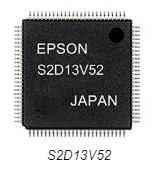Epson increases in-vehicle display efficiency
SYDNEY, 18 March 2020 – Epson has developed and begun accepting orders for samples of the S2D13V52, a scaler IC for in-vehicle systems that upscales or downscales image data streamed from a host and outputs it on a display. Epson plans to produce 100,000 of the new chips per month.

Vehicle electrification and automation are seen driving future demand for higher resolution displays in in-vehicle systems such as instrument clusters and central information displays. However, high-resolution display systems require high-performance systems on a chip (SoC)*1, memory, and other components, as well as immense development resources for aspects such as software and heat countermeasures.
To address these types of issues in in-vehicle display systems development, Epson developed the S2D13V52, a scaler IC that is compliant with automotive standards. This IC, which does not need external memory and uses a proven SoC, facilitates rapid development of display systems with the desired resolution. The scaler IC satisfies the strict quality requirements of the automotive industry.
It is compliant with AEC-Q100*2 and operates at temperatures up to 105℃. It also supports input cropping, a function for specifying regions of input images to be scaled, and area blanking, a function for displaying a specified color in the display area that remains when scaling was set to a size smaller than the resolution of the panel. Images can be displayed on panels of various resolutions without changing the aspect ratio of images.
Epson is committed to helping its customers improve the performance of their products with solutions that leverage Epson’s efficient, compact, and precision technologies.
Click on the PDF attachment here for specifications.
For more information about this product go to: global.epson.com/products_and_drivers/semicon/products/interface_auto
*1: System on a chip
A system on a chip (SoC) integrates most or all the functions required for the operation of a system on a single chip. The configuration differs depending on the system, but SoC generally integrate a CPU, memory, and I/O functions.
*2: AEC-Q100
The Automotive Electronics Council (AEC) is an industry group that creates standards for the reliability and qualification of automotive electronics. It was formed by the “Big Three” U.S. automobile manufacturers in partnership with major electronic component manufacturers. The AEC standard is a de facto global standard that has been widely adopted as a standard for automotive electronic components.
Picture credits
Epson S2D13V52 scaler IC for in-vehicle systems